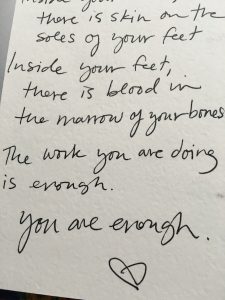The title “Pre-car(e)-ity” has been drawn from mayfield brooks’s performance.
Space is made and held. And then it undoes itself, slow fade. When we hold, we hold it for others. We hold each other.
Somewhere, Fred Moten says something like: “you’re already doing the thing (that calls you? that you need to do?) when you get together to figure out what is to be done.” It seems fitting that because I couldn’t remember exactly how this quote was phrased, I texted my friend James when I got home to ask him how he remembered it (“you’re already doing the thing you mean to be doing when you get together to figure out what to do”). And so, in our own way, we were already doing the thing, too—touching knowledges under the guise of figuring, in the space that figuring it out makes and holds.
What kind of labor is making and holding space? Move(d) into the center. Center the black, the feminine, the queer. Name these knowledges, these movements, their provenance, their power.
****
Learning how to build like this, how to be (together) like that, how to hold (each other) like this, how to move and be moved like that, requires an unlearning, too. (Because there is so much that we learned too well. We felt ourselves becoming formed too tightly. We became (re)productive and private and professional.)
Intimate pedagogies: care differently, unfold a different rhythm, teach refusal but also reaching-finding-roaming. Teach and learn how to both build and run. A woven line of flight. In but not of. “fugitive movement in and out of the frame, bar, or whatever externally imposed social logic—a movement of escape, the stealth of the stolen that can be said…” (Fred Moten, “The Case of Blackness”)
To live freely, dangerously—to be a danger to their wealth, their power, to threaten their institutions. (The dance company needs the dancer, but cannot bear her, cannot bear what she brings.)
Fugitivity: what are you running from? what is being embraced?
Are you sure that what you do in the bar is not study? Do you know (for sure) what you will find when you come together? When we decolonize our spaces of study, we can imagine an endless (never selfsame) relation like/in/as the knit of a web. Maybe we just move together for a little while and talk softly and have a beer and oh wait will you dance with me too?
“I’m glad the mind and the body are happening together” (Ni’Ja Whitson). That’s another way of listening, of being heard. The feeling that pain & pleasure & power & flight are all encysted in the body. I feel good here. I know something (differently) here.
“There are no new ideas. There are only new ways of making them felt.” Just new ways of holding and being held, new registers of listening. A way of feeling the body, feeling the other feeling you, haptic brush of a knitted home, a way of navigating your way through its flexible architectures. “And there are no new pains. We have felt them all already.” (Audre Lorde, “Poetry Is Not a Luxury”)
Our circle unclasps itself, spreads out. What does space feel like when it’s open? Available? Fluid? In motion? When it wavers and inverts itself? When centers & margins move, become porous? When it becomes a practice?
Knowledges always danced unpredictably, didn’t they? But we had to unlearn somehow and learn how to make recognition (and care) our (poetic) praxis. Can you find the thing we’re already in, the thing we want, that thing we know we know—and then let it breathe, give it space? “Our feelings were not meant to survive.” (Lorde)
But we felt them anyway. We reached toward that abundance.
